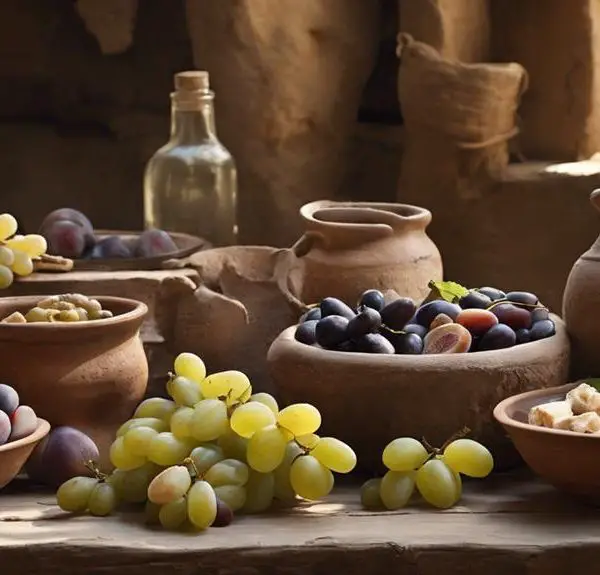Fragrant and revered, cassia in the Bible holds secrets and symbolism, inviting a deeper exploration into its spiritual and cultural significance.

What Is Cassia in the Bible
In the rich tapestry of biblical narratives, cassia isn't just a plant; it's a whisper from the past, hinting at deeper spiritual and cultural significances.
You might find yourself surprised at how this aromatic herb weaves its way through ancient texts, offering both the literal fragrance in religious rituals and a metaphorical scent in poetry and prophecy.
As you explore its roots and significance, you'll uncover layers of meaning that go beyond its initial appearance. Why does cassia hold such a revered spot in scriptural references, and what can it teach us about the everyday lives and spiritual practices of our ancestors?
You're on the cusp of discovering a facet of biblical history that might change the way you view ancient texts.
Key Takeaways
- Cassia symbolizes wealth, honor, and sanctity in biblical contexts.
- It was an integral part of the holy anointing oil, denoting purification.
- Biblical references to cassia highlight its importance in ancient agriculture and trade.
- Cassia's significance extends to spiritual practices, symbolizing righteousness and beauty.
Definition and Origins

Cassia, originating from the aromatic bark of several plants in the genus *Cinnamomum*, holds a significant place in biblical contexts, often symbolizing wealth, honor, and sacrifice. You'll find that cassia identification isn't as straightforward as you might think. It's crucial to distinguish it from cinnamon, a closely related species, though both share similar properties and origins. Historically, cassia's identification was pivotal for trade, as its value was immensely high, akin to gold or precious stones in certain cultures.
Exploring the trade routes, you'll uncover that cassia's journey to prominence wasn't merely about its aromatic qualities but also its role in early commerce. These routes stretched from the Indian subcontinent, through the Middle Eastern deserts, to the Mediterranean, illustrating its significance in ancient trade networks. The complexities of these routes, fraught with dangers and the challenges of preservation, highlight the lengths to which traders went to transport this precious commodity. This exploration isn't just about the routes themselves but also what they represent: a testament to the value of cassia in ancient economies and its enduring legacy in history.
Biblical References
In exploring the sacred texts of the Bible, you'll find numerous mentions of cassia, each serving as a window into the cultural and religious practices of ancient times. These references illuminate not only cassia's cultivation but also its significant role within scriptural narratives, providing a rich tapestry for understanding its importance.
Cassia's cultivation, deeply rooted in ancient agriculture, is hinted at through its repeated mentions, suggesting a familiarity and reverence for this plant among the peoples of the Bible. This context enriches scriptural interpretations, offering insights into the daily lives and spiritual practices of these communities. For instance, cassia was part of the holy anointing oil as described in Exodus, symbolizing cleanliness, sanctity, and the divine.
Moreover, the scriptural interpretations of cassia's mentions extend beyond its physical uses, hinting at deeper theological themes. Through an analytical lens, you'll discern how cassia's fragrance and properties were metaphorically employed to discuss righteousness, beauty, and God's overwhelming favor.
Thus, when dissecting biblical references to cassia, you're not merely tracing a botanical detail. You're delving into a complex symbol interwoven with the spiritual fabric of ancient societies, offering a nuanced understanding of its scriptural and cultural significance.
Symbolic Meanings

Exploring the symbolic meanings behind cassia's mention in the Bible reveals a layer of spiritual and cultural depth that extends beyond its physical attributes. Cassia, as referenced in religious texts, isn't just a plant or an ingredient; it's a conduit for understanding ancient beliefs and practices. Through its mention, you can unearth the intricacies of how societies perceived the divine and integrated these perceptions into their daily lives and rituals.
In analyzing cassia within a biblical context, several symbolic meanings come to light:
- Purification and sanctity: Cassia was often used in religious rituals, symbolizing the purification process. Its inclusion in sacred ointments underscores its role in preparing individuals and spaces for divine worship.
- Wealth and prosperity: The rarity and value of cassia in ancient times made it a symbol of wealth and prosperity. Its use in religious ceremonies could also represent a form of spiritual wealth.
- Divine connection: The aromatic qualities of cassia made it ideal for use in religious rituals, facilitating a sensory bridge between the earthly and the divine.
These cultural interpretations illustrate the multifaceted role cassia played in religious contexts, underscoring its significance beyond mere physical uses.
Ancient Uses
Delving into the ancient uses of cassia unveils its critical role in myriad practices ranging from medicine to religious rituals. This aromatic spice, derived from the bark of Cinnamomum cassia trees, was not only cherished for its fragrance but also for its medicinal properties. Its cultivation and export played a significant role in the economies of ancient civilizations.
Use |
Description |
|---|---|
Medicine |
Cassia was used as a natural remedy for various ailments, including colds and nausea. |
Religious Rituals |
Incorporated into anointing oils and incense, symbolizing purification and sanctity. |
Culinary |
Added to food and beverages for flavor, demonstrating its versatility beyond rituals. |
Trade |
Cassia cultivation and export routes were crucial in ancient commerce, connecting distant lands through trade networks. |
Aromatherapy |
Its scent was believed to have calming effects, used in spaces for meditation and spiritual practices. |
Cassia's cultivation and the strategic establishment of export routes facilitated its global dissemination, intertwining cultures through trade and exchange. This historical context underscores the importance of cassia beyond its sensory appeal, highlighting its role in health, spirituality, and economic development in ancient times.
Modern Significance

Despite its ancient roots, cassia retains significant relevance in modern-day practices, spanning culinary, medicinal, and aromatic applications. This continuity underscores not only the enduring appeal of cassia's rich aroma and flavor but also its adaptability and importance across cultures and epochs.
Analyzing the modern significance of cassia, we observe its integration into contemporary life through several avenues:
- Cassia cultivation has evolved, with advanced agricultural techniques enhancing yield and quality. This progress ensures a steady supply for its varied uses, reflecting an intricate blend of tradition and innovation.
- In the culinary world, cassia's distinctive taste enriches a plethora of dishes, showcasing its versatility in both sweet and savory recipes. This wide-ranging applicability highlights cassia's enduring culinary appeal.
- Religious practices continue to incorporate cassia, echoing its biblically noted sacredness. Its use in rituals and ceremonies bridges ancient traditions with modern spiritual expressions, illustrating the persistent resonance of cassia's symbolic significance.
In essence, cassia's journey from ancient texts to contemporary relevance is marked by its multifaceted applications. Its enduring presence in religious, medicinal, and culinary realms attests to its significant role in human culture, transcending temporal and geographical boundaries.
Frequently Asked Questions
How Does the Cassia Plant's Cultivation and Harvesting Process Differ Today From Ancient Times?
Today's cassia plant cultivation and harvesting processes have evolved significantly from ancient practices, primarily due to modern techniques and climate influences.
You'll find that advancements in agricultural technology allow for more efficient cultivation, ensuring plants are more resilient to varying climate conditions.
Additionally, modern harvesting methods have streamlined the process, making it quicker and less labor-intensive.
This stark contrast highlights how technological progress and understanding of climate impacts have revolutionized cassia production.
Can Cassia Found in the Bible Be Directly Linked to Any Specific Species Known to Modern Botany?
You're diving into a botanical mystery that would make Indiana Jones envious! Linking cassia mentioned in ancient texts to a modern species is no small feat. Scholars pore over Biblical translations, attempting to match descriptions with contemporary flora.
This quest for modern identification challenges even the most seasoned botanists. While direct correlations are elusive, the analytical pursuit enriches our understanding of historical contexts and botanical evolution.
Are There Any Documented Historical Events or Figures Outside the Bible That Mention the Use of Cassia?
Yes, there are documented historical events and figures outside the Bible that mention the use of cassia. It was highly valued in ancient trade routes for its aromatic uses, featuring in the economies of several ancient civilizations.
Historical records from Egypt, Rome, and China illustrate its significance, with emperors and pharaohs using cassia for its fragrance and medicinal properties. This sheds light on its global importance beyond biblical references.
How Has the Interpretation of Cassia's Symbolic Meanings in the Bible Evolved Over Different Theological Eras?
As you delve into the heart of the matter, you'll find that cassia's symbolism in the Bible has been a subject of evolving theological interpretations over centuries. Scholars have peeled back layers of ancient texts, revealing how perceptions of cassia have shifted from mere commodity to deep spiritual emblem.
These transitions reflect broader theological shifts, illustrating how religious understanding matures over time, much like a fine wine. This journey through theological eras showcases the dynamic nature of biblical interpretation.
What Are the Environmental Impacts of Cassia Cultivation in Regions Where It Is Grown Extensively Today?
You're exploring the environmental impacts of extensive cassia cultivation today. This cultivation affects local ecosystems, primarily due to cassia's role in recipes and landscaping.
The demand for cassia can lead to monoculture farming, reducing biodiversity and altering soil composition. Overuse in landscaping can introduce cassia as an invasive species, disrupting native plant communities.
Analyzing these impacts reveals a complex interplay between agricultural practices and ecological health, necessitating sustainable approaches to cassia cultivation.
Conclusion
In conclusion, cassia in the biblical narrative serves as a profound allegory, a mirror reflecting both the spiritual richness and the earthly utility embedded in ancient traditions. Your exploration unveils its layered significance — from sacred anointments to daily uses, symbolizing purification, royalty, and divine connection.
This intricate tapestry, woven with threads of historical, cultural, and spiritual insights, invites you to ponder the depths of ancient wisdom and its enduring relevance in the modern tapestry of faith and life.



Sign up